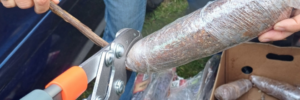The inspectors destroyed hundreds of propagating materials for fruit planting in the Ónod market
The inspection of the sale of spring grape and fruit propagating materials continued. At the beginning of April, experts from the National Food Chain Safety Office (Nébih), county government offices, and NAV held an official inspection at the National Animal and Exhibition Fair in Ónod. During the operation, they had to destroy hundreds of propagating materials for fruit planting. The most common problems were with the quality of the propagating materials, but the inspectors also found a number of shortcomings in relation to the labels. In the case of the rose stems, the lack of variety designation and documents proving the origin was striking.

(Photo: Nébih)
As in previous years, the aim of the campaign was to detect the illegal trade in propagating material, call for correct market behavior and help customers. The increased presence of authorities was confirmed by the results. During the inspection of the Ónod market at the beginning of April, hundreds of fruit planting material had to be destroyed because the sellers involved wanted to sell propagating material of unknown origin and problematic quality.
Among the fruit grafts, among others, were apples, pears, quinces, plums and peaches, while in the case of ornamental planting material, rose stems were destroyed on site
In addition to quality complaints, the biggest problem with the items seized and destroyed on the spot was the lack of labels and their illegal copying. The authorities were forced to destroy hundreds of fruit trees, because the fruit grafts were given a photocopied label. The label can be certified-blue or asymptomatic C.A.C.-lemon with a higher breeding grade. Each label has a unique serial number, but in several cases the numbers were the same on the poor quality photocopies.
In the case of rose stems, the inspectors noticed a lack of variety identification and documents proving their origin
Inspectors regularly find at occasional markets that vendors have extremely low knowledge of plants. Therefore, a cautious attitude is particularly justified on the part of buyers in these places, since by planting illegal, uncontrolled propagating material, they can cause many problems in their existing plants. It is gratifying that the impact of the inspections of recent years can be clearly seen: traders and producers as a whole are increasingly complying with the rules. In the future, Nébih will continue to take the necessary steps to fully eliminate illegal distribution. If a propagation material does not meet the legal requirements, the authority destroys it and initiates the imposition of a quality protection fine against the trader. In the interest of the sector, the series of inspections will continue in the fall.
Nébih draws the customers’ attention to the fact that they primarily buy propagating materials produced in Hungary, because this is how they get access to high-quality fruit propagating material checked by the authority. With their choice, they also help the survival and development of the domestic propagating material production!
Nébih
Related news
The presence of bird flu has also been confirmed in Bács-Kiskun County
🎧 Hallgasd a cikket: Lejátszás Szünet Folytatás Leállítás Nyelv: Auto…
Read more >Related news
Nestlé to sell remaining ice-cream assets but commits to Froneri venture
🎧 Hallgasd a cikket: Lejátszás Szünet Folytatás Leállítás Nyelv: Auto…
Read more >Lidl guarantees fairer prices for cocoa farmers
🎧 Hallgasd a cikket: Lejátszás Szünet Folytatás Leállítás Nyelv: Auto…
Read more >40 secure jobs, sustainable solutions – new BURGER KING® in Csepel
🎧 Hallgasd a cikket: Lejátszás Szünet Folytatás Leállítás Nyelv: Auto…
Read more >









